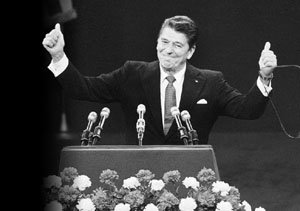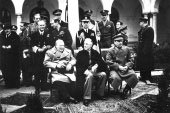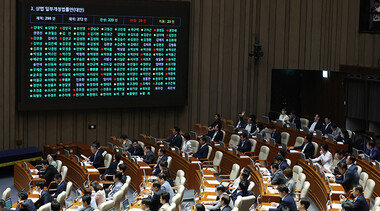- 위대한 대통령은 어떤 잣대로 평가할 수 있을까? 미국의 저명한 역사학자이자 대통령학의 권위자인 리처드 노턴 스미스씨는 도덕적 기준, 신비감, 당대의 잣대 등 8가지 기준을 제시했다. 이번 호 ‘시사영어 따라잡기’는 포브스에 실린 ‘대통령을 판단하는 8가지 기준’ 기사를 바탕으로 반복적 표현을 피해가며 좋은 글을 쓸 수 있는 방법을 제시한다.

로널드 레이건 전 미국 대통령.
(버락 후세인 오바마 2세는 제44대 미국 대통령입니다. 하지만 역대 미국 대통령에 대해서 얼마나 알고 계십니까? 많은 사람이 조지 워싱턴이 미국 초대 대통령이라는 것을 알고 있지만 제10대나 제20대 대통령이 누구인지는 잘 모릅니다. 물론 20세기 후반 이래의 대통령들은 현재와 가깝기 때문에 좀 더 친숙하게 마련입니다. 그렇다면 무엇이 위대한 지도자를 만들고 역사는 그러한 지도자들을 어떻게 판단할까요? 기준이 무엇일까요? 역사는 어떤 대통령이 위대하고 어떤 대통령이 그렇지 않은지를 어떻게 평가할까요?)
Eight Rules for Judging a US President
“There is no single rule for assessing presidential performance.”
Richard Norton Smith of George Mason Universitya , a renowned historian and a scholar of U.S. presidents, said this at the 13th Annual Wharton Leadership Conferenceb.
He suggested eight rules for a more objective assessment of the chief executive, saying opinions of the commander-in-chief “bounce around like corn in a popper”. Smith′s eight rules for judging a president were posted on Forbes.comc.
① A leadership style of doing nothing is more problematic: Think Thomas Jefferson, who purchased the Louisiana territory in 1803 from France; Lyndon B. Johnson, who passed the Civil Rights Act of 1964; Harry Truman, who stopped communist aggression in Korea; and Richard Nixon, who began dialogue with China.
They were risk takers while in office but history rated them highly. The most difficult leadership decision could be to do nothing, however. George H.W. Bush snubbed the historic moment of the collapse of the Berlin Wall in 1989d to avoid angering Russia.
② A president′s power comes from moral authority: Franklin Roosevelt built emotional credibility as he encouraged Americans to overcome the Great Depression in his radio speechese. Ronald Reagan survived an assassination attempt and underwent surgery in 1981f. He reassured Americans when he jokingly said, “Honey, I forgot to duck”.
③ A great president has a “great enemy”: Franklin Roosevelt had Benito Mussolini of Italy and Adolf Hitler of Germany, while Reagan had what he called the “evil empire” in the Soviet Union. These fights against their enemies made people believe they were proud warriors defending their people′s freedom.
④ A great president should have an air of mythology: Reagan′s national security adviser Robert McFarlane said, “He knows so little and accomplishes so much”. In other words, Reagan personified the principle that great leaders are essentially “mysterious figures.”
⑤ Popularity is not legacy: The beloved Warren G. Harding turned into one of the most maligned U.S. presidents after scandals broke out after his deathg. Criticism increased and newly discovered facts showed that he lacked ability in the course of becoming president and lacked quality as president. Harding, however, won his battles and helped bring stability after World War I.
⑥ Don′t judge a president by today′s standards: Modern scholars undervalue Andrew Jackson, who expanded voting rights from certain white people with land to all white people, but say he paid little attention to women and blacks. For a correct assessment of a president, the thoughts of the people and conventions of the times should be considered.
⑦ Accepting “unintended consequences”: Woodrow Wilson wanted to become the father of a “new freedom” emphasizing smaller national government, but failed in the wake of World War I. His vision was overtaken by unexpected events.
⑧ Even a weak president has a legacy: History generally is kind to strong presidents. Yet Calvin Coolidge, who was considered indecisive, should be reassessed in that he protected taxpayers and refrained from expanding the government.
원문출처: http://english.donga.com/srv/service.php3?bicode=060000&biid=2009073103158

1945년 얄타회담의 주역인 처칠, 루스벨트, 스탈린 (앞줄 왼쪽부터).
“대통령의 업적을 평가하는 데 단일한 기준은 없다.”
미국의 저명한 역사학자이자 대통령학의 권위자인 리처드 노턴 스미스씨(조지 메이슨대 초빙 학자)가 최근 13회 와튼 경영대학원 리더십 연례 세미나에서 이렇게 말했다. 그는 리더에 대한 의견은 불에 달궈진 팬 안에서 옥수수가 팝콘으로 바뀌며 튀겨나가듯 제각각이라면서 CEO에 대한 객관적인 평가를 위한 8가지 잣대를 제시했다. 대통령을 평가하는 8가지 잣대에 대한 글은 포브스 닷컴에서 찾을 수 있다.
① 아무것도 하지 않는 리더십 스타일은 논란을 야기한다. 1803년 프랑스로부터 루이지애나를 사들인 토머스 제퍼슨, 1964년 민권법을 통과시킨 린든 존슨, 6·25전쟁 참전을 결정한 해리 트루먼, ‘죽의 장막’ 중국과 공식 대화를 시작한 리처드 닉슨 대통령을 생각해보라. 이들은 집권시에는 모험을 즐기는 사람이었지만 역사는 그들에게 후한 평가를 내렸다. 그러나 리더의 가장 어려운 결정은 아무것도 하지 않는 것이다. 조지 H.W. 부시 대통령은 러시아를 자극하지 않기 위해 1989년 베를린 장벽이 무너지는 역사적 순간을 무시했다.
② 대통령의 힘은 도덕적 권위에서 나온다. 대공황 속에서 프랭클린 루스벨트는 노변담화(爐邊談話)라 불린 라디오 연설로 국민에게 수시로 위기 극복 의지를 차분히 설득해 감정적 신뢰를 쌓았다. 로널드 레이건은 1981년 저격을 당했으나 살아남아 병원에서 수술을 받았다. 그는 부인에게 “여보, (총에 맞지 않기 위해) 허리 숙이는 걸 깜박했어” 라는 농담으로 미국인들을 안심시켰다.
③ 위대한 대통령에게는 ‘위대한 적(敵)’이 있다. 루스벨트에게는 이탈리아의 무솔리니와 독일의 히틀러가 있었고 레이건에게는 그 자신이 ‘악의 제국’이라고 하던 소련이 있었다. 이들이 적과 싸우는 모습은 국민에게 자유를 수호하는 자랑스러운 전사로 비쳤다.
④ 위대한 대통령은 신비감을 갖고 있어야 한다. 레이건 국가안보고문이던 로버트 맥팔레인은 “(레이건은) 아는 건 너무 적었지만, 이룬 건 매우 컸다”고 평했다. 다시 말하면 레이건은 위대한 지도자는 기본적으로 ‘신비한 인물’이어야 한다는 원칙을 잘 구현했다.
⑤ 인기는 유산이 아니다. 국민에게 사랑받던 워런 하딩 대통령은 사후 터져나온 스캔들로 미국에서 가장 명예가 손상된 지도자 가운데 한 명이다. 비난이 쇄도했고, 새롭게 밝혀진 사실에 따르면 그는 선거과정에서, 그리고 대통령으로서도 능력과 자질이 부족했다. 그러나 어쨌든 하딩은 자신의 ‘전쟁’에서 승리했고, 또 제1차 세계대전 이후 나라를 안정적으로 이끄는 데 기여했다.
⑥ 대통령을 현재의 잣대로만 평가하지 말라. 현대의 학자들은 일부 백인 지주에게만 허용됐던 참정권을 전 백인 남성에게로 확대한 앤드루 잭슨을 저평가한다. 여성과 흑인을 소홀히 했기 때문이라는 것. 그러나 대통령을 제대로 평가하려면 당시 사람들의 생각과 시대상이 고려돼야 한다.
⑦ ‘의도하지 못한 결과’를 받아들일 것. 우드로 윌슨은 작은 정부를 지향하는 ‘신(新)자유주의’를 주창했지만 제1차 세계대전으로 실현하지 못했다. 그의 이상은 예기치 않은 사건 탓에 실패했다.
⑧ 나약한 대통령조차 물려줄 게 있다. 역사는 일반적으로 강력한 대통령에게 후한 평가를 내린다. 그러나 우유부단하다는 평을 듣는 캘빈 쿨리지 같은 대통령은 납세자를 보호하고, 큰 정부를 지양했다는 점에서 재평가돼야 한다.
▶▶ Exercise: Comprehension Check (연습 : 이해도 확인)
You can often check your understanding of a text through paraphrasing, or using different words to describe the same idea. This is a common technique in many English language course books and tests. Check your understanding of Richard Norton Smith′s eight rules by matching the numbered descriptions in the text (①~⑧) with the paraphrased descriptions here:
(같은 생각을 다른 단어로 표현하거나 부연함으로써 글에 대한 이해도를 점검할 수 있습니다. 이는 많은 영어 교재와 시험에서 사용되는 일반적인 방법입니다. 리처드 노턴 스미스 교수가 제시하는 위의 8가지 법칙을 얼마나 이해하고 있는지를 확인하기 위해 지문의 ①~⑧을 지문에 나온 것과 다른 단어를 사용해 요약한 아래의 표현들과 짝지어보시기 바랍니다.)
I. Consider carefully what each President left behind, regardless of their reputation.
II. The past is a foreign country.
III. Was the President′s intention disrupted by something beyond his control?
IV. Was this leader too passive, or a decisive personality?
V. This person stood up for the rights of the nation in the face of outside aggression.
VI. A person who can be respected because they know when to do the right thing and stick to their principles.
VII. It′s less important how much such a leader is adored; don′t jump on the bandwagon.
VIII. Can we be sure how this personality achieves their results? Are their methods beyond ordinary understanding?
※jump on the bandwagon : 시류에 편승하다, 인기에 영합하다.
▶▶ Answers- Comprehension Check(정답- 이해도 체크)
I. ⑧ II. ⑥ III. ⑦ IV. ① V. ③ VI. ② VII. ⑤ VIII. ④
▶▶ Exercise: Writing to Avoid Repetition (연습: 같은 표현을 피하는 글쓰기)
Of course, in terms of writing in English, it′s useful to be aware that readers will be irritated by constant repetition of the same words or phrases, even though grammatical necessity often demands, for example, a noun with a transitive verb, and it sometimes seems difficult to avoid using the same words again and again. Repetition can, in fact, be a powerful tool in your attempts to create a cohesive textual argument, but this does not imply a need to use the same words over and over again. One technique to avoid such repetition is to use synonyms -`words that have similar, but not always exactly the same, meanings (e.g. the author used Russia and the Soviet Union as synonyms, but Russia was only one national Soviet in the Union of Soviet Socialist Republics, which eventually dissolved into 15 separate states). The text shows plenty of examples of synonyms when referring to its topic`-`presidents of the USA. See how many words or phrases relating to presidents, their leadership, or what they do that you can find while reading the text again, and then see if you found everything by looking below.
[영어로 글을 쓸 때 같은 단어나 표현의 반복적 사용을 피하기 어렵지만 독자는 이를 좋아하지 않는다는 것을 염두에 둘 필요가 있습니다. 사실상 반복은 일관성 차원에서 중요한 도구가 될 수 있지만, 그렇다고 이것이 같은 단어를 계속해서 반복할 필요가 있다는 뜻은 아닙니다. 반복 표현을 피하기 위한 한 가지 방법은 비슷한 말을 사용하는 것입니다.(예를 들어 이 글에서는 Russia와 Soviet Union을 번갈아가며 사용하였습니다만 실은 러시아는 15개의 주로 나뉘어 있는 소비에트 연방 사회주의공화국의 한 부분에 불과합니다) 이 글에서는 미국 대통령이라는 주제를 다루면서 반복을 피하기 위해 대통령, 리더십, 업적과 관련된 단어나 구를 다양하게 표현했습니다. 이를 확인해보시고 아래와 비교해보시기 바랍니다.]
▶▶ Writing to Avoid Repetition(같은 표현을 피하는 글쓰기)
Synonyms for ‘president’ or a president′s activities used in the text:
a US President
presidential performance
U.S. presidents
the chief executive
the commander-in-chief
a president
a leadership style
risk takers
while in office
leadership decision
a president′s power
moral authority
a great president
great leaders
mysterious figures
one of the most maligned U.S. presidents
proud warriors
the father of
national government
a weak president
strong president
the government
(‘대통령’과 대통령의 행위와 관련된 유사어)
As you can see, repetition can be avoided or disguised lexically through:
(반복되는 표현은 다음과 같은 방법을 통해서 피하거나 감출 수 있습니다):
※Changing the form of the word(단어의 품사 바꾸기), e.g. president, presidential, president′s.
※Modifying the word with an adjective or compound(형용사 등으로 수식하기), e.g. a weak president, strong presidents, US President.
※Synonyms(비슷한 말), e.g. chief executive, commander-in-chief, government.
※Using associated ideas(비슷한 뜻의 다른 단어 사용하기), e.g. leadership, moral authority, even the father.
※Creating associations(비유 사용하기), e.g. risk takers, mysterious figures, proud warriors.
There are other ways to avoid repetition of words, and these include:
(단어의 반복적인 사용을 피하는 또 다른 방법이 있습니다):
※Using names, e.g. everyone knows Barack Obama is President of the USA, so you can say Barack, Obama, or Barack Hussein Obama II.
(이름을 다양하게 사용하기. 예컨대 누구나 미국 대통령이 버락 오바마인 것을 알고 있기 때문에, Barack, Obama 또는 Barack Hussein Obama II라고 말할 수 있습니다.)
※Using pronouns or other generic referents(대명사 또는 지시어 사용하기), e.g. he, the others.
※Elision: this is the removal of an unnecessary word or phrase where the context is clear(생략하기: 문맥이 명확할 때 불필요한 단어나 구를 빼는 것), e.g. Most people know that George Washington was the first, but who was the tenth, or the twentieth?
▶▶ Notes and Explanations (주와 설명) Vocabulary
Bounce around like corn in a popper- When corn is heated in a pan it bounces around all over the place and then suddenly expands to become ‘popcorn’, hence this simile.
(옥수수가 팬에서 불로 익혀질 때 이리저리 튀고 순식간에 커져서 팝콘이 되는 형태를 비유하고 있습니다.)
Snubbed- Snub (verb) means to ignore someone (or in this case an event), usually as a means to insult them.
[snub (동사)은 누군가 (이 글에서는 사건을) 무시하다라는 뜻으로 대개 모욕하는 수단으로 사용됩니다.]
To duck- Duck (verb) means to lower your head or body suddenly to avoid hitting / being hit by something (since ‘to grouse’ means to complain, you sometimes see comic signs in old British pubs hanging over low entrances saying ‘duck or grouse’).
[duck(동사)은 부딪히는 것을 피하기 위해 급히 머리나 몸을 숙이다라는 뜻입니다. (‘to grouse’가 불평하다라는 뜻인데, 옛날 영국 술집의 낮은 출입구에는 흔히 ‘duck or grouse(머리 숙이든지 부딪히고 불평하든지)’라는 재미있는 간판이 걸려 있곤 했습니다.]
Battles- In this sense meant figuratively, as in ‘a battle of wills’, and has nothing to do with World War I.
(여기서는 ‘의지의 투쟁’에서처럼 비유적으로 쓰인 것으로, 제1차 세계대전과는 무관합니다.)
Undervalue- Undervalue is a verb, meaning to fail to ascribe adequate value to something or someone. While ‘value’ can be a noun or a verb, undervalue cannot: there is a less common noun form ‘undervaluation’.
(undervalue는 동사로서 사람 또는 사물의 가치를 하향평가한다는 의미입니다. Value란 단어가 동사와 명사로 공히 사용될 수 있는 것에 반해 undervalue는 주로 동사로만 사용된다는 것을 기억하십시오. undervaluation이란 말은 자주 쓰이는 단어가 아닙니다.)
In the wake of- ‘Wake’ here is the trail left by a passing boat or other travelling object on the surface of the water: ‘in the wake of’ therefore means ‘following’ or, sometimes, ‘as a result of’.
(여기서 ‘wake’는 보트나 다른 움직이는 물체가 물의 표면에 남기는 흔적을 말합니다. 따라서 ‘in the wake of’는 ‘~을 따라서’ 또는 때로 ‘~의 결과로’라는 의미가 됩니다.)
A legacy- Something that is passed down from one generation to the next, either as a result of activity or action (as in the text), or as a legal inheritance when someone dies.
(한 세대에서 그 다음 세대로 전해지는 무언가를 말하며, 글에서처럼 어떤 활동이나 행위의 결과 또는 누군가 죽었을 때 받게 되는 법적 상속이라는 뜻이 됩니다.)
▶▶ 주 해설
aGeorge Mason University- a university in Fairfax, Virginia, close to Washington DC, and strong in Economics and Public Policy.(워싱턴 DC와 가까운 버지니아주의 페어팩스에 있는 대학. 경제학과 공공정책 분야에 강하다.)
bThe annual Wharton Leadership Conference- is an academic forum based at the Wharton School, University of Philadelphia; the 13th was in June this year(필라델피아대의 와튼스쿨에서 열린 학회)
c Forbes- an American publications and media company, focussing on business and economic news.(비즈니스와 경제 뉴스에 초첨을 맞추고 있는 미국의 미디어 회사)
d The Berlin Wall, which separated West Berlin from the rest of East Germany, did not in fact ‘collapse’; it was pulled down by German citizens who saw an opportunity to rid themselves of a hated symbol of their Communist government′s oppression, and enforce de facto re-unification of the two Germanies before the politicians could act. It is, however, common to say that the Soviet Union ‘collapsed’.
(사실 동독의 나머지 부분에서 서베를린을 분리하고 있던 베를린 장벽이 ‘무너진’ 것은 아니다. 공산 정부의 억압을 상징하던 벽을 무너뜨린 이들은 바로 독일 시민들이었다. 그리고 정치인들이 행동하기 전에 그들이 사실상 두 개의 독일을 통일하도록 했다. 그럼에도 소비에트연합이 ‘무너졌다’고 말하는 게 일반적이다.)
eThe Great Depression began in 1929 with the Wall Street Crash, and Roosevelt was elected largely to solve problems seen as his predecessors′ doings. He became famous for his regular ‘Fireside Chats’, when families would seek reassurance from their President through the radio ? TV not having been established yet.
(대공황은 1929년 월 스트리트 주식 대폭락으로 시작됐고, 루스벨트 대통령은 선출된 뒤 주로 전임자가 해야 할 일로 간주된 문제들을 해결했다. 그는 ‘노변담화’로 불리는 방송으로 유명해졌다. 당시 TV가 정착되기 전이어서 각 가정은 라디오를 통해 들려오는 대통령의 말에 귀를 기울이며 위안을 얻곤 했다.)
f Reagan and three other people were wounded as shots were fired by John Hinckley Junior. Hinckley was found not guilty of attempted murder by reason of insanity (he was obsessed with actress Jodie Foster)and has been incarcerated since in a psychiatric hospital.
(레이건 대통령과 3명이 존 힝클리 주니어가 쏜 총에 맞아 부상했다. 힝클리는 정신이상자(배우 조디 포스터에 대한 망상 증세가 있었다)로 살인미수 혐의가 적용되지 않았다. 이후 그는 정신병원에 감금됐다.
gThe scandals actually involved members of Harding′s administration, rather than the President himself, but he was later discovered to have known something of what was happening, and yet had refused to go public.
(이 스캔들은 하딩 대통령 자신보다는 하딩 정부의 다른 사람들이 연루됐다. 그러나 그는 이 사실에 대해 뭔가 알고 있었으나 숨겼다는 것이 밝혀졌다.)
마틴 구시는 서울 광화문 주한영국문화원에서 코스 창의력과 학생 지원 담당 매니저로 일하고 있다. 영국 런던 정경대에서 역사학 석사학위를 받은 구시는 경력 15년의 베테랑 강사이며, 한국에서 3년째 살고 있다.























![[지상중계] 제12회 나지포럼, “북미 정상회담 성과내기 어려워”](https://dimg.donga.com/a/380/211/95/1/ugc/CDB/SHINDONGA/Article/69/43/48/32/69434832107aa0a0a0a.jpg)
